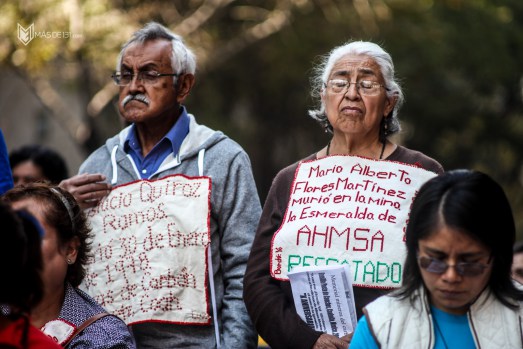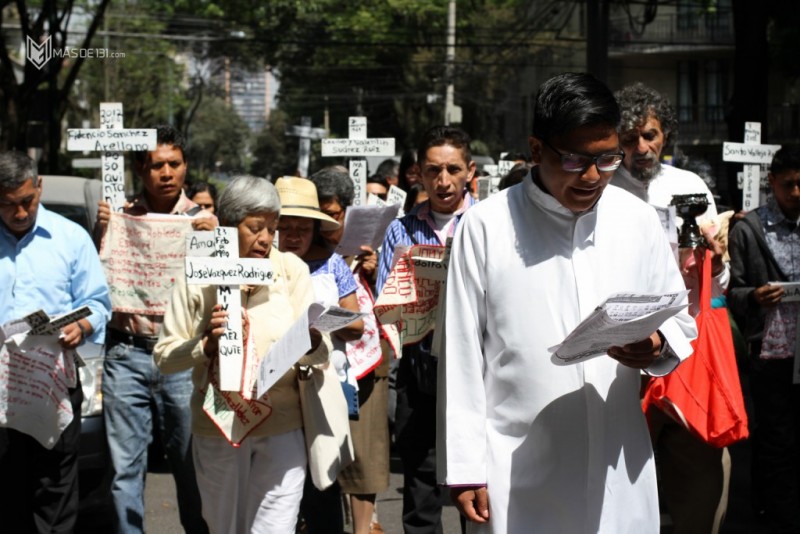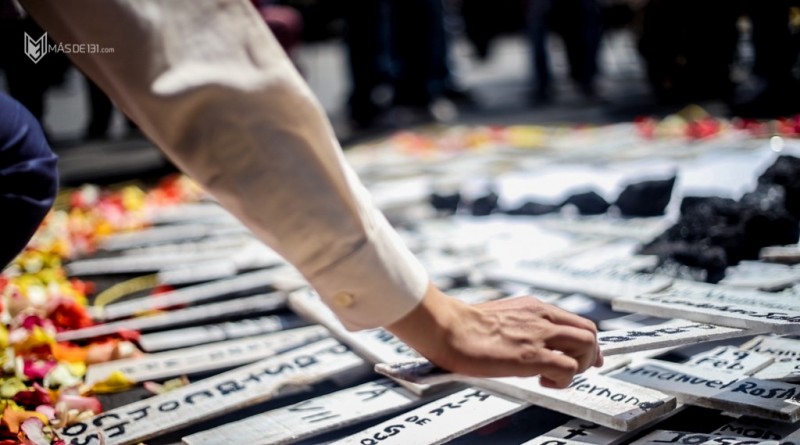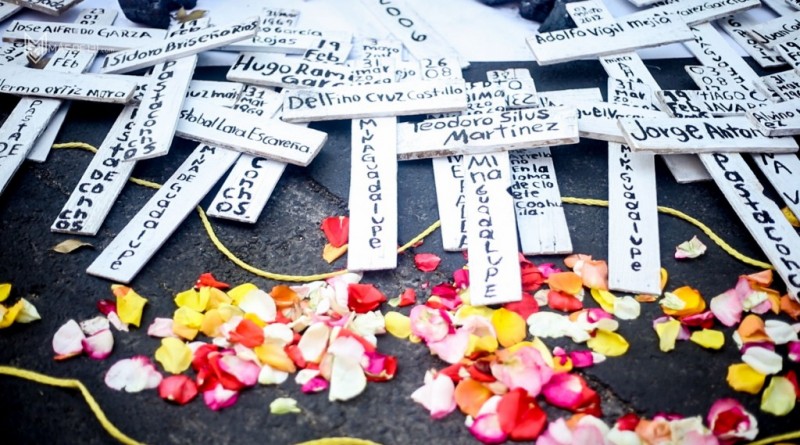
The organization Pasta de Conchos Family. Photo by Daliri Oropeza (@Dal_air) for Másde131. Used with permission.
The organization Pasta de Conchos Family has a very clear motto: “Lives are worth more than coal”. Their work has expanded beyond demanding the recovery of the bodies of their loved ones, abandoned by the federal government in 2006 in a mine owned by Grupo México, to defending other miners’ rights, protecting the environment, creating memorials, and creating alternative jobs for workers with disabilities caused by mining accidents. Their goal: to ensure that what happened to their family members does not happen again.
Ten years ago, during the wee hours of February 19, 2006, 65 miners became buried in Mine 8, Pasta de Conchos Unit, a property of Grupo México managed by Germán Larrea. The main cause of was a lack of security, supervision and sanitation. After the accident, rescue efforts lasted only a couple of days, while the country's president at the time, Vicente Fox, sent a message saying “he prayed to God for the miners”. The secretary of labor announced five days later that the miners had died.
In 1889, 300 miners died in the El Hondo Pit. It's the first documented record of an accident in the region's carbon mines. Thirteen years later, 135 persons died in the same place. According to a document given to Másde131 titled “Our History”, in which Pasta de Conchos Family's work was documented, it's calculated that 402 miners have perished in Grupo México's mines alone. In total, around 3,000 miners have died in the region since the end of the 19th century.
Cristina Auerbach, a human rights defender and member of Pasta de Conchos Family, described how in the coal region there is a shared sentiment between the miners and their families: since nobody considered the violation of their rights to be reprehensible, death in the mines became natural, a usual death. Miners say they know where they will go in, but not where they will come out. There are families in the town where the grandfather died in a pit, the orphan son once grown perished there too, and so on for three or four generations. Auerbach added:
Es una historia de muerte con la que es necesario reconciliarse.
El aporte de estos 10 años fue romper ese enclave, romper la lógica de muerte que había. Ese es el aporte que hemos podido dar.
It's a history of death that we need to come to terms with.
The value of these past 10 years was that we broke this embedded idea; we broke the established logic of death. That is what we have accomplished.

Memorial marking 10 years since the tragedy of Pasta de Conchos. Photo by Mariana Sarava for Másde131. Used with permission.
Recovering memories as a family
In the coal region, isolated and alone, building an organization where people feel like a family is an achievement. Pasta de Conchos Family is not a union; it's a group of fathers, mothers, children, active workers, survivors, and community members affected by mining. Many of the people from the region emigrated from San Luis Potosí and Zacatecas. The organization has people from all parties and churches.
On March 3, 2006, a few weeks after the accident, the Pasta de Conchos Family first marched to the office of the International Labor Organization (Organización Internacional del Trabajo) in Mexico's capital city to demand the retrieval of their loved ones’ bodies. Their efforts did not end there. Nearly a year later, they arrived again all together at a memorial in front of the corporate offices of Grupo México located in the luxury neighborhood Polanco, this time with families from other mines: Lulú, Pocitos Ferber, Vertical 4, Mine 5 (The Emerald) and AHMSA's Mine 7 (Saltillito). There were people from the towns of Palaú, Nueva Rosita, Progreso, Barroterán in the caravan.
“Something that we did was to own the symbolic ground,” Auerbach remembered. She recounted that in 2007, on the first anniversary of the tragedy, they planted crosses outside the mine with the names of each worker, the owner, and the date of death. “The first 65 were Pasta de Conchos, but after we put the names of other miners too”. Today, authorities want to take down the dozens of crosses at the entrance of the mine.
Closing pits and planting chiles
The topic of coal mining is complicated. It goes through three levels of government. The concession is granted by the Ministry of Economy, but the mayor gives permission for land use.
Pasta de Conchos Family works with various towns in the region, including Cloete, where mining pits can be found on community lands, on the streets, almost under the houses. People joke: Cloete is the only place where mines have an address and postal code.
Residents of Cloete and Pasta de Conchos Family succeeded in stopping the loud, dusty, and contaminating work of the pits officially. Their next step is to ask for them to be covered.
Auerbach explained:
Lo que nos une es la certeza de que la vida vale más que el carbón y de ahí no nos mueven, está encima de contratos, concesiones, acarreo. Si para sacar el carbón vas a afectar la vida no te dejaremos sacarlo.
We are united by the certainty that life is worth more than coal, and no one can make us change that. It's a belief that goes beyong the contracts, concessions and transportation. If by digging for coal you are going to affect life, we will not allow it.
Additionally, it is common in the area to see disabled miners in wheelchairs who do not have a job anymore and can't find anything to do. Some even resort to begging. Various of these former miners organized themselves and formed social cooperatives to look for some type of livelihood. For example, in the Ejido de Minas de Barroterán community, workers who survived accidents in mines have a farming cooperative of an hectare where they plant piquin and Japanese chili peppers. They have discovered that there are other means to work beyond digging for coal.
Finding the courage to speak up
In the years following the tragedy of Pasta de Conchos, the situation for miners worsened, especially in 2011. That year, a record number of two miners per month died.
During the 2011 memorial, Pasta de Conchos Family presented the report, “Dime desde allá abajo” (Tell me from the underground). They showed official documents stating the conditions of mines from 2008 to 2010. Ever since, the organization has presented annual reports proving that tragedies in the coal region are not accidents, spontaneous or unavoidable. In 2012, 33 coal miners died inside the mines.
After former Secretary of Labor Javier Lozano, who repeatedly acted in favor of Grupo México, resigned in 2012, the government granted Pasta de Conchos Family access to mine inspection reports since 2000. They noticed then that the miners had been complaining of the same conditions for years.
After that, they changed their strategy. Since August 2013, Pasta de Conchos Family has accompanied the secretary of labor's inspectors. They launched a campaign among miners and their families urging them to report to authorities when security and sanitation regulations and labor rights were violated. They handed out 30,000 cards with phone numbers and addresses so they could make accusations anonymously.
In 2012, 33 workers passed away; in 2013, two died; in 2014, three perished; and in 2015 one person died.
“They saw that we did not have to put an end to mining; rather we had to put an end to the deaths,” explained Auerbach, who shared that now they even receive these reports of poor conditions through Facebook and Twitter.

Remembering Pasta de Conchos. Photo by Daliri Oropeza for Másde131. Used with permission.
Who's at fault in the Pasta de Conchos tragedy?
Regarding those responsible for the security of miners, Auerbach said:
Creo que señalamos claramente desde el inicio al Estado, más allá de si eran los presidentes Fox, Calderón, Peña Nieto, hay una institucionalización de la impunidad.
Para nosotros como Familia Pasta de Conchos, da lo mismo si es del PAN, del PRI, el resultado es igual: No es un asunto ni de personas ni de partidos, sino del Estado, el que está obligado de tutelar, promover los derechos humanos y laborales.
I believe we have clearly pointed out that the state, beyond just presidents Fox, Calderón, Peña Nieto, there is an institutionalized impunity.
For us, Pasta de Conchos Family, it is the same if it's the PAN [National Action Party] or PRI [Institutional Revolutionary Party], the result is identical. It is not a matter of people or parties, rather the state. It is the state who is obliged to enforce protection and to promote human and workers’ rights.
“Turn in those responsible for Pasta de Conchos so that society will believe that you'll retrieve those who disappeared,” Pasta de Conchos Family told former Attorney General of Mexico Jesús Murillo Karam. The government official told them that rescuing the bodies was a presidential decision, but he later changed his mind.
On September 1, 2015, after the case was juggled among different judges who prevented the families from entering the mine to retrieve the remains of the workers, the attorney general's office declared itself incompetent to continue the inquest opened on November 13, 2013. Karam left the position and now Arely Gómez, the current attorney general of Mexico, says that the crimes have reached their statute of limitations. But Pasta de Conchos Family is questioning why the attorney general's office claims it cannot prosecute the crimes when it was them who let them reach the statute of limitations in the first place.
An audit, paid for by Grupo México and conducted by expert D.G. Wooton in 2007, said rescuers cannot go down into the mine because of the risks of HIV and tuberculosis infections due to contaminated water. The company points to the audit as a reason not to hand back the miners’ bodies. There's also a rumor that in 2016, the Pasta de Conchos mine will open under another legal name: Mina Reunificación Fresnos (Fresnos Reunification Mine), which is legally impossible because two years ago the Ministry of Economy suspended the concession. Pasta de Conchos Family has been waiting since 2010 for the Inter-American Commission on Human Rights to take up their case.
A rope of life
Four whistles into pre-hispanic seashells purified the memorial place. In front of the Jesuit priests and Pasta de Conchos Family an offering was placed. In the middle, a cross made of coal rocks was set, an element that gives life and death — at once providing the region with work, but also bringing accidents and environmental destruction. Around the cross, the names of the 65 miners were written; and next to it, a yellow rope. The rope that miners use to communicate if they run into trouble.
The ceremony was part of a commemoration of the 10th anniversary of the tragedy on February 19, 2016. The families of Pasta de Conchos had traveled one full day to remember the miners in front of Grupo México's corporate offices.

“The rope is what should be followed if an accident happens in the mine. It brings the message, the word is tied to it. The rope encircles the symbol of Pasta de Conchos Family. The rope, in a way, is the guide for the rescue.” Photo by Daliri Oropeza (@Dal_air) for Masde131. Used with permission.
One of the widows, Elvira Martínez, said:
Voy a volver aquí las veces que tenga que venir hasta que los logremos rescatar. Seguimos en pie y a Germán Larrea (director ejecutivo de Grupo México) le decimos que no olvidamos y vamos a estar viniendo hasta rescatar lo que es de nosotros.
I am going to come back here as many times as I have to, until we manage to rescue them. We are still standing; and we tell Germán Larrea (executive director of Grupo México) that we will not forget and we will keep coming back until they rescue what is ours.”
At the beginning, all the attendees received a cloth embroidered with the name of each miner. After the families lit 10 candles, one for every year of waiting, they placed the clothes behind them.
The memorial ended on the idea of continuing their fight in the coal region. That perseverance is their rope, and if it had a little slip of paper on it, it would read, “Life is respected”. If the rope was Fox's, Calderón's, Peña Nieto's, it would say, “Life is purchased”.
Once they reach the other side of that rope, these families will finally have peace.






